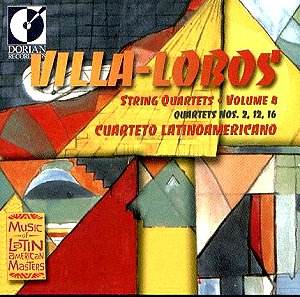The standards set by this series are continued
in the fourth volume of six. Villa-Lobos may lack Shostakovich’s
greatness of utterance but his body of seventeen quartets is one
of the most significant of the century. As before this disc ranges
over the years, and shows his ingenious approach to rhythm, colour,
harmony and tonality, one that is consistently inventive and attractive.
There is, in the light of his later works in the medium, a very
beguiling lyricism in the opening of the Second Quartet of 1915
and Villa-Lobos makes sure that the succeeding Scherzo is well
laden with colour, vibrancy and harmonic novelties. The slow movement
is rich and warm and rises to peaks of unison eloquence, spiced
with little moments of yearning intensification. As with so many
of these Quartets the finale is propulsive and energetic, the
slow sections drawing reminiscently on the music of the central
two movements. There’s plenty of ricochet bowing and a gleeful
Spanishry about much of it – not necessarily convincingly integrated
but enjoyable and enticing.
The much later Twelfth (1950) opens in brisk
style but there’s no clotting in the writing – the writing is
clearer, especially in comparison with his earlier self’s impressionistic
affiliations. What there is, in profusion, is a sense of songful
reverie and repose. The slow movement is marked Andante malinconico
and there is a long-breathed and affecting depth to it as well
as a particularly diverting central section. This is in effect
a Fughetta-as-song episode redolent of Haydn - not for nothing
did Villa-Lobos revere Haydn’s quartets. Fluttering and fluting
fiddles grace the Allegretto as does a sweeping little fugal section
and a strong rhythmic drive – one of his most graceful scherzi.
Once again the finale is saturated in song and the élan
of his writing is laced with bustle and exultation. It’s true
that Villa-Lobos can sometimes seem sectional – that block writing
can edge toward the blatant – but his life-force illuminates these
works from within and in a finale such as this the sheer affection
of the writing is wonderful elating.
Finally, the Sixteenth. There’s a deal of virtuoso
writing for the first violin in the opening movement and the mood
ranges from the initial withdrawn feeling to a more succulent
and effervescent one – but there’s plenty of clarity. The Andante
is limpid with a strongly etched cello line (Villa-Lobos’s own
instrument) that ascends the scale to a moment of Tristanesque
affirmation and release. It has about it an unusual nobility and
stoicism and the plentiful counterpoint adds great weight to the
musical argument. Impressive. The Scherzo is correspondingly light-hearted
with chattering dialogue and spiccato-laced bowing whilst the
finale has lovely ornamental sounding "leaps." It could
do with being played a notch or two faster than the Latin American
Quartet take it.
Once again this is a thoroughly convincing traversal
in a natural acoustic with fine, helpful notes. The more I listen
to these quartets the more I’m convinced that everyone should
have at least three of them in their collection.
Jonathan Woolf
Other
reviews
Volume
1
Volume
2
Volume
3
Volume
4
Volume
5
Volume
6
